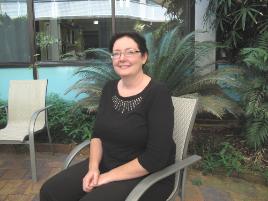Animal interactions assist with therapy
Published on 06 September, 2012
An animal-assisted therapy approach to working with children and adolescents who are victims of family, domestic or sexual violence is showing positive results, according to CQUniversity researcher Dr Tania Signal...
Dr Signal has been working in partnership with Dr Nik Taylor of Flinders University and Bundaberg's Phoenix House, a non-Government organisation which provides a public health response to the prevention and intervention of domestic and sexual violence.
The idea for an animal-assisted therapy project has come on the back of Dr Signal's research which shows children who exhibit violent or harmful behaviour towards animals may be 'at risk' for some form of family, domestic or sexual violence at home.
In 2005, Phoenix House and RSPCA delivered an ‘Animal Assisted Therapy' program developed by Dr Signal and Dr Taylor. Children entered the 10-week program which involved visiting the local RSPCA shelter and interacting with dogs.
During this time, a specialised RSPCA education officer delivered a hands-on humane education program designed to model appropriate behaviour with dogs.
From there, a Phoenix House social worker worked with children to transfer these interaction skills from animals to humans, including human-directed empathy, body language and feelings, non-verbal and verbal communication.
Due to the success of the program, an ‘Equine Assisted Therapy' project was born - based on a similar concept and this time involving horses.
Children and adolescents who had experienced some form of family violence, and were attending Phoenix House for assistance, worked with staff to interact with horses, which they groomed, fed and provided general care for.
Dr Signal and a CQUniversity honours psychology student have since been analysing two years' worth of data from the Equine Therapy project to determine the effectiveness of such therapy - and they are finding interesting results.
"Research has previously suggested that ‘traditional' therapeutic approaches may not be as effective in supporting children from Indigenous backgrounds as we would like," Dr Signal said.
"Add to this the fact that children and adolescents can be difficult to engage in traditional therapies, so these kind of animal-assisted programs are helping to ease communication difficulties and increase positive outcomes for these individuals."
She said the program works by moderating a child's behaviour, with both dogs and horses being able to sense if someone is tense or stressed. Qualified social workers then work with the children to calm these attitudes and help carry those behavioural skills into other areas of their lives.
Dr Signal said her research shows the positive impact of early therapeutic intervention on the lives of children and their families, with the majority showing significant improvement in trauma symptoms post-intervention, and increases in self-efficacy and well-being irrespective of ethnicity or gender.
Director of Phoenix House, Kathryn Prentice said Dr Signal's seven-year partnership with the organisation has seen major developments in the prevention and improvement of both humans and animals affected by violence.
"Tania has made significant contributions to several areas of program development, including assistance with the development of funding applications and evaluation of major programs for funding bodies," she said.
"Her commitment to the study of trauma of both humans and animals and developing better ways of preventing and ameliorating the impact of such trauma has been outstanding."
The research was recently featured in an international publication for professionals working with abuse cases in the US.


